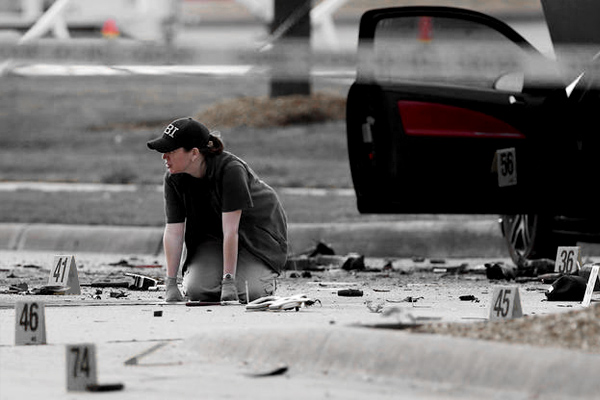
What We Know About the Texas Muhammad Cartoon Attack
- By Alison Lesley --
- 04 May 2015 --

Yesterday evening, two men attacked a Muhammad cartoon contest in Texas, shooting a guard. The attackers died after the police returned fire.
The shooting started when the two attackers arrived and shot a security guard just before the event was about to finish. The event was heavily protected as the AFDI invested thousands of dollars in securing a heavy police presence. The officers returned fire and the attackers were killed. However, their bodies remained on the scene while investigators were concerned about the possibility of a car bomb. A bomb squad robot was brought in to check the vehicle. The event’s attendees were immediately evacuated by bus.
The shooting occurred at an art event called “Draw Muhammad” for the inauguration of the Muhammad Art Exhibit. The contest took submissions of cartoon depictions of the Islamic prophet Muhammad and offered a $10,000 prize to the winner. The cartoon that won featured an angry Muhammad wielding a sword with the caption “You can’t draw me!” He is being drawn by a hand that replies “That’s why I draw you.” After the Charlie Hebdo attack in France, many know that depictions of the Prophet are strictly forbidden in the Islamic faith. The sponsors of this event knew the controversy they were stirring. The American Freedom Defense Initiative (AFDI) claims to defend American ideals by attacking the faith of Islam. The organization’s president is Pamela Gellar, who also heads the Stop Islamization of America (SIOA). The Southern Poverty Law Center labels both organizations as hate groups.
Multiple shootings, possible bomb at AFDI/Jihad Watch free speech event in Texas: This is a war. This is war o… http://t.co/eAyMlcowMd
— Pamela Geller (@PamelaGeller) May 4, 2015
One of the gunmen, Elton Simpson, known as Ibrahim after his conversion to Islam, was already on the FBI’s radar. As early as 2006, the FBI began investigating him on beliefs that he was planning to start a terrorist cell in Arizona. In 2010 he was questioned about potential plans to travel to Somalia. Officials believed he may be going there to learn from al-Shabaab, a militant group. At the time, the FBI could not find Simpson guilty of any terrorist acts or plans, instead convicting him of only making a false statement about his plans to go to Somalia.




















